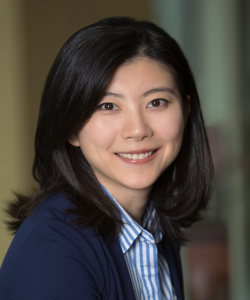
Angela Zhang ’14S (MSF)
Vice President, BlackRock
By Bret Ellington
After completing the Master of Science in Finance (MSF) program at Simon in 2014, Angela Zhang’s primary goal was to work in asset management. Less than a year later, she landed a job at the world's leading asset management company—BlackRock. Today, as a vice president, she provides advice on asset allocation and portfolio construction to institutional investors across pensions, endowment foundations, and family offices. Throughout her career at BlackRock, Zhang has held many diverse roles.
Shortly after joining BlackRock, she started in the Aladdin Group, covering insurance clients, before moving on to participate in firm-wide strategic initiatives, including BlackRock's acquisition of eFront. In this position, she worked on the go-to-market strategy and the integration of Aladdin and eFront technologies for various client types.
She said these experiences and opportunities have contributed to her holistic understanding of the asset management industry. “Working with different groups within BlackRock has enabled me to really see the landscape across so many aspects of the business—from financial technology and asset management to institutional retail and many other client segments,” said Zhang.
The Simon network
Zhang emphasized the significant impact the Simon alumni network had on her career, especially as an international student. She said her first internship offer in New York City was extended by a Simon alumnus and the opportunity provided her with valuable experience and a strong foundation in the financial world. “That internship helped me build my confidence and find my footing in the city as well as the United States,” she said. “I appreciated every moment, so I really want to do the same for future Simon alumni whenever I can.”
The Simon experience
Before Simon, Zhang graduated from the University of International Business and Economics in Beijing, China with honors. Eager to further her education to pursue a career in finance, she sought opportunities in the United States. Zhang said the motivation for choosing Simon was a combination of the school’s flexibility and an academic program that could accommodate her aspirations, whether they leaned toward industry or academia. “While the curriculum was very practical, the courses were academically stronger compared to other programs,” she said.
Simon’s strong academic foundation and practical relevance prepared her to take on the world of finance in any capacity. She specifically credits a derivatives class taught by Professor John Long (now a professor emeritus). The intensity of the course, with its rapid coverage of complex material, tested the limits of Zhang and the rest of her cohort and left a lasting impact. “It was a very challenging class but also a very rewarding class. Looking back, it seems like he covered at least 100 pages worth of material every 45 minutes,” she said laughing. Zhang also highlighted the positive influence of professors Anzhela and Diana Knyazeva, who are now both senior financial economists at the U.S. Securities and Exchange Commission. The two instructors were highly respected during their time at Simon and Zhang said they served as role models for many female students. | “That internship helped me build my confidence and find my footing in the city as well as the United States. I appreciated every moment, so I really want to do the same for future Simon alumni whenever I can.”
—Angela Zhang ’14S (MSF) |
Additionally, Professor Gregg Jarrell's finance class, focusing on corporate valuations, left a profound impression on Zhang. The course was designed to engage students actively through negotiations and transactions, providing practical experience she said is invaluable in the finance industry.
Trends and challenges in finance
Three years ago, Zhang moved to the institutional client group, where she observed a significant shift in how clients view trading and portfolio construction in her field. Clients, Zhang said, have evolved from focusing on individual investment product risk and return comparisons to adopting a more holistic approach. They now consider how new asset classes and products fit into their overall portfolio, aligning with their goals and objectives.
“I believe the ‘whole portfolio’ approach has transformed the industry and emphasized the importance of a comprehensive perspective on investments,” she said. “After the regional banking crisis, we observed the rise of private debt as an asset class. As a response, many banks shrank their balance sheet and tightened their lending standards. This has led to the emergence of private credit offerings, which offer a higher risk-adjusted return compared to other asset classes.”
Outside of work
Balancing work life and personal life remains a challenge for Zhang, especially after welcoming a baby into her family (six-months old at the time of this writing). However, she said adaptability and flexible time management are key, and she still manages to find time to volunteer for an organization working to improve the living environment in her community. “BlackRock offers a lot of opportunities to volunteer through the company. I’m currently involved in a project based on Staten Island called the Billion Oyster Project (BOP). Their mission is to restore one billion oysters to New York Harbor by 2035,” said Zhang.
According to the BOP website, oyster reefs have water-filtering power and provide habitat for hundreds of species and protect the city from storm damage. BOP collects oyster shells from New York restaurants to create reef structures. The clean shells are bound into artificial reef structures and seeded with baby oysters before being placed in the harbor. “It has been a great way to bond with my colleagues, and it’s just fun and rewarding. We’re helping make New York City a better, cleaner, place to live and work,” said Zhang. “I’ve also learned a lot about marine biology in the process.”
The future
Zhang's career goals continually evolve every few years as she gains a deeper understanding of her capabilities, areas of expertise, and, of course, where the business is headed. She said in the foreseeable future, she will remain committed to BlackRock's mission.
“Joining BlackRock was an incredible milestone moment for me. I thought it was a pretty big deal at the time I was hired, and it’s still a very big deal for me today,” she said. “Looking ahead, I will continue to remain unwaveringly committed to improving our clients' financial future as well as their financial literacy. I see myself continuing to progress and grow as a portfolio consultant, keeping up with the market, the client, and investments.”
Zhang said that generative AI is currently generating quite a buzz within BlackRock, particularly in equity research. While she is closely monitoring developments in generative AI, she acknowledges that its impact on her work is not yet fully clear. “What we are helping clients do now is better understand, through analytical frameworks, how much they are exposed to the generative AI themes,” she said. “A lot is yet to be determined, but the best way to be prepared is to be well informed.”
